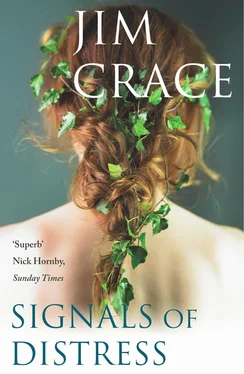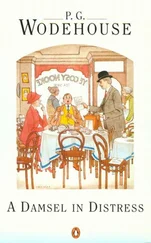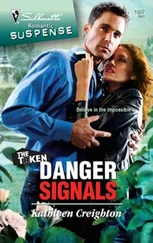Aymer’s appetite for kelpers and their daughters was diminishing when he saw Miggy Bowe and Ralph Parkiss with their stolen cow.
‘Good morning, sirs,’ he called, a long man in a black tarpaulin coat, hurrying to catch up with them on the path. ‘Please stand and wait for me.’ They turned to answer him. He waved. They stood stock-still, uncertain what to do. Miggy knew the type of man he was, though he was out of season, a winter cuckoo. From time to time, usually in the spring and summer, she’d come across such pale-looking fellows walking on the coast, with knapsacks on their backs, and walking sticks. These were the only people that she’d ever met that were more than a day’s walk from their homes — apart from Ralph. They might be alone, in pairs, in groups of four or five. Often they were lost. They asked directions to the Cradle Rock which, it seemed, they’d travelled all this way to see. Their purpose was to touch and sway the Rock. They’d missed it by a half a mile or more. There’d always be a penny in it if Miggy would lead them to the Rock and show them where they had to put their backs to set it in motion. Sometimes these men took their easels to the beach, or sat on dunes with sketch pads on their knees. Sometimes they came with hammers and broke up rocks, fossil-bibbing, or spent inexplicable hours attending on the sea birds. Miggy would then earn pennies by showing where the razorbills were nesting, or clambering down loose cliffs to collect gulls’ eggs for them. Occasionally there were ladies, too, with umbrellas and clothes that were, for Miggy, colourless and disappointing. One of Walter Howells’s men from Wherrytown or George from the inn was often in attendance as a guide and porter. Then there’d be a picnic on the sand and Miggy, if she smiled and was polite, could importune some bread and mutton for herself. She dreamed some man — some gentleman — would buy her for a penny and take her far from home.
Aymer didn’t have a bag or easel. She presumed he was a man who’d missed the Cradle Rock. Except he didn’t seem lost, but purposeful. Perhaps he’d come about the Belle . An excise man? No, he was far too tall and clerky, and excise men didn’t work on the Sabbath. A shipping agent, then? Someone with proper title to the cows? Now Miggy was alarmed. He waved at them again, and whistled. A dog — the same small bitch that had gone off with the American sailors the day before — ran out of the furze, circled the stranger, and then ran barking towards Miggy, Ralph Parkiss and the heifer. The young cow broke away and ran. Miggy didn’t attempt to hold her. She let the rope fall. She waved back at the man, and when she lowered her arm tucked her neckchief, the red-and-white ensign from the Belle , under her smock. Perhaps he was a ship’s officer. He had the ship’s dog, after all. And one sleeve of his coat was armless. Perhaps he’d hurt it in the storm. Perhaps he’d lost it in a brawl with pirates, or a whale, or in the war with Bonaparte. Perhaps he’d seen they’d roped the cow. Ralph would be in trouble. Miggy Bowe rocked from foot to foot. She was set in motion by two men like the Cradle Rock, swaying, heavy, inconsolable. Her heart was beating fast.
‘Is he your captain, Ralph?’ she said.
‘I don’t know who the fellow is. I saw him at the inn last night.’
The dog did not respond to Aymer’s ‘Down, Whip. Down.’ She’d found two friends, one who smelled of other dogs, and one who was a shipmate. She nuzzled Ralph. She jumped at Miggy’s legs and licked the stains of breakfast from her fingers.
‘Good morning, gentlemen.’ Aymer reached them on the path. He put his hand out, first to Ralph. ‘I know you, sir, I think. We dined together at the inn. Yes, yes. I know a face.’
He turned to Miggy.
‘My little lady,’ Miggy said, using Whip to shield her from the handshake that Aymer was offering, ‘come to see us, have you, sweet? Is she yours, this little ’un?’ Aymer blushed. Not his first blush of the day. He hadn’t known she was a girl, a pert-faced, handsome girl at that. She was dressed like a farmboy.
‘I’m Aymer Smith of Hector Smith & Sons,’ he said. His face had quickly cooled and paled. ‘And you? What are your family; kelpers?’ Any hopes that Miggy had that this man had lost an arm to whales were shattered. His voice was not heroic, but clipped and fussy. You might imagine him to be distinguished, dashing at a distance, but now his face was close she saw he was quite old, older than her mother anyhow, and gaunt. He had a second arm, as well. It moved below his coat.
‘We kelp a bit,’ she said.
‘And do you supply Mr Howells with soda ash?’
‘Walter Howells? He has our kelp.’
‘So then, what is your name?’
‘I’m Miggy Bowe.’
Again he offered her his hand. She hid her hands, and backed away. ‘I’m only seventeen,’ she said.
‘What does that mean? That you’re too young to shake my hand?’
‘I never had to shake a hand before.’
‘My dear Miss Bowe,’ he said, ‘it is not important that you shake my hand. I merely offered it to mark our meeting and to introduce myself. A dog that rushes to you with its tail in motion is a dog you need not fear. And so it is with strangers, except of course we shake our hands and not our tails. A footpad or a common thief does not hold out his hand to shake, but only to relieve you of your watch or silver. But still, I will not trouble you to shake my hand. You should not do what does not suit you, or else you will be unhappy all your life.’ He put his hand into his coat. ‘Here, take some soap,’ he said. ‘It is more useful, I agree, than handshaking.’ Miggy Bowe, who had no watch or silver and was unhappy all her life, could not see the relevance of soap. She turned her back and ran. She didn’t think that she’d be caught by Aymer Smith. He was too flimsy to give chase. But Ralph and Whip were fit. They soon were at her side.
ROSIE BOWE released her mongrels and went out, stick in hand, to meet the man that Miggy and the sailor had described.
‘We’d roped a likely little cow, Ma, and got it halfway home and then he tries to fetch hold of my hand. I don’t know what he might’ve done if Ralph didn’t come by. I never seen a man so long and thin and strange. He’s talkin’ like you never heard before. He had his arm hid in his coat. He might’ve had a pistol there. He said I was to tell if we sell kelp to Walter Howells. And then he gave me soap.’
‘Let’s see the soap.’
‘I wouldn’t take no soap.’
‘Miggy Bowe, if this is lies …’
‘It in’t no lie. I wouldn’t tell no lie on Sabbathday.’
‘She’s right,’ Ralph said. ‘The fellow’s got a pocketful of soap. And when he talks it’s like a sermon.’
The man, when he arrived, it’s true, was tall — but Rosie felt no fear of him. He was a spindleshanks. He wouldn’t have the strength or pluck to trouble them. She calmed the dogs and put her stick away. She even shook his hand. She didn’t want him in her home — where Miggy and the sailor stood behind the door — and so she made him state his business in the cold and open air. She listened as he gave his name and that of Walter Howells. She’d heard of Smith & Sons, of course. She knew her soda ash was sold to finish up in soap. She guessed as soon as Aymer mentioned Duty and Conscience that there would be bad news.
‘Alas,’ he said, after what seemed an endless doorstep homily on everything from soap to sin, ‘my brother has no further need of kelp. His business with Dry Manston and with you and Walter Howells cannot survive the summonses of science or of progress. I come to thank you for your efforts in the past and to present you with a shilling for your troubles, and some soap.’ He put five bars of soap down on the yard bench. Whip sniffed at them, but wasn’t interested. Rosie felt the same. Already, she was angry with the man. How would they live without their thirty shillings for a ton? And then he held the shilling up. ‘For you,’ he said. ‘By way of thanks. And may it bring you better fortune.’
Читать дальше












